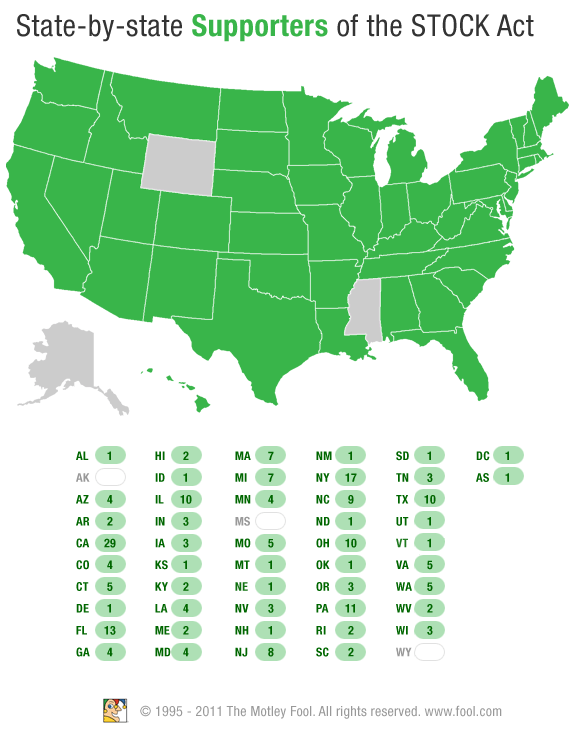Ambush on Capitol Hill!
Salary of members of the United States Congress: $174,000.
Average annual Civil Service Retirement System benefits for retired members as of 2007: $63,696.
Profits they can make by trading on inside information: Priceless.
Up on Capitol Hill, the STOCK Act's march toward becoming law has been swift, thanks largely to pressure that you, the Foolish community, have put on your elected representatives. This law, which would ban insider trading in Congress and require members to disclose their stock trades in a timely manner, is no longer "orphaned legislation." From a bare half-dozen supporters just one month ago, it's grown into a monster movement backed by 222 co-signing representatives today. Here's how the map looks:

But like they say in Congress: "Money talks." With individual members of Congress standing to make big bucks from trading on inside information under the status quo, you have to expect there will be bumps on the road to passage. Today, we hit one.
Cantor cracks the whip
On Tuesday, the STOCK Act received its first serious attention in Congress, when Congressman Spencer Bachus' House Financial Services Committee held a generally favorable committee hearing on the legislation. Surprisingly, Bachus -- who's caught some flak over allegations that he personally benefited from the lack of trading restrictions in Congress -- announced in Tuesday's meeting that he'll give the act a second hearing next week, then proceed to the House floor for open debate.
Then Cantor cracked the whip. As reported on Politico, House Majority Leader Eric Cantor smacked down his colleague for failing to seek approval from Republican brass. Perhaps that's not surprising. After all, disclosure filings from Cantor show he leads a pretty active trading lifestyle -- investing in everything from ethanol producer Archer Daniels Midland (NYS: ADM) to utilities like Con Ed (NYS: ED) and Georgia Power (NYS: GAR) , to mining operations Cameco (NYS: CCJ) , Newmont (NYS: NEM) , and Rio Tinto (NYS: RIO) . He's even alleged to have shorted the U.S. Treasury market in the middle of the financial crisis, trading shares of the ProShares Trust Ultrashort 20+ Year TreasuryETF (NYS: TBT) . (Need I even say it? Rep. Cantor is not a co-signer on the bill.)
Whatever Cantor's motivations, though, after emerging from a closed-door meeting with his "boss," Bachus announced late Wednesday night that the STOCK Act will in fact not be receiving a second hearing -- nor will it be heading to the House floor anytime soon. Instead, he needs "additional time to study this issue before the committee moves forward with the markup that was announced for Dec. 14." And not just that, but the act now must run the gauntlet of "five other House committees" before it sees the light of day.
Unacceptable
This, dear Fools, must not stand. With apologies to our elected representatives for their creative efforts, I have to say: As stalling tactics go, this is pretty bald-faced. While there are certainly flaws in the STOCK Act as currently drafted, these flaws consist in the restrictions not being tough enough. For example, the act requires members of Congress to disclose their stock trades a mere four times a year, rather than disclosing an intent to trade before buying or selling stock -- the standard that we adhere to here at the Fool in all of our newsletter recommendations.
Could the bill be better? Sure. But let's be crystal clear: Some limitation on insider trading in Congress is better than no limits at all. And already, 222 members of Congress -- from both sides of the aisle, mind you -- have put their names and their reputations on the line, co-signing the STOCK Act and saying in effect: "Yes, we know the bill needs improvement. But no, don't kill it in committee again -- as you've done three times already, since the bill was first introduced in 2006. We want to take a look and make those improvements."
Here at the Fool, we second that motion. This is going to sound trite, but I'm going to say it anyway: This is still a democracy, Mr. Cantor, and in a democracy, the majority's vote is supposed to count for something. Here at the Fool, we've heard from thousands of individual investors demanding passage of the STOCK Act. Up on Capitol Hill, 222 of your colleagues agree with us. 222 out of 435 voting representatives... unless my math is off, that adds up to a majority.
So do what the majority demands, Mr. Cantor. Release the STOCK Act from committee. Bring it to the floor. Allow America to vote.
What can you do to help? If you support the STOCK Act:
Send a blank email to imoscovitz@fool.com to let us know that trading on inside knowledge of upcoming laws in Congress is not OK with you. We'll keep you apprised of where the legislation's at, and what you can do to help move it forward.
And don't feel compelled to wait on us, either. Take direct action to get this law passed: Add your voice to the petition urging Congress to get off its keister and pass the STOCK Act now!
At the time thisarticle was published Unlike certain members of Congress we could mention, Fool contributorRich Smithdoes not own (or short) shares of any company named above.Motley Fool newsletter serviceshave recommended buying shares of Dominion Resources.The Motley Foolhas adisclosure policy.We Fools may not all hold the same opinions, but we all believe thatconsidering a diverse range of insightsmakes us better investors.
Copyright © 1995 - 2011 The Motley Fool, LLC. All rights reserved. The Motley Fool has a disclosure policy.

